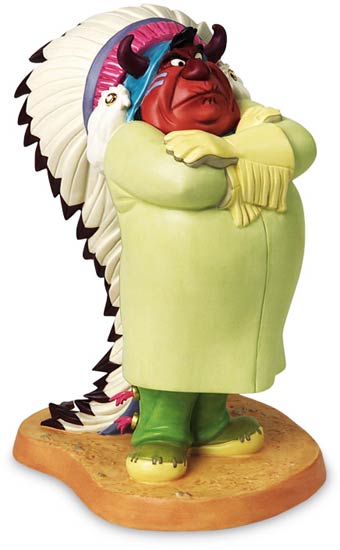Pop culture is the source
Getting the "Indian" out of the Cupboard: Using Information Literacy to Promote Critical ThinkingUnfortunately, it is naive to assume that decades of commentary, discussion and education have managed to eradicate adoption of stereotypes as part of popular culture or as part of the worldview of many young people. Indians are still icons for professional and educational institution team sports mascots, still mythologized as beautiful princesses rescuing noble explorers, and still marketed as knowledgeable in secret ways leading to spiritual redemption. In the years since Disney's 1995 popular animated film, Pocahontas (Schumacher), "Native American princess" Halloween costumes have resurfaced, with politically correct "Native American" replacing "Indian" as the operative adjective. A perusal of any local book or music store will yield an abundance of titles geared to non-Indian audiences who seek the knowledge of shamans, healing ceremonies and Native American spiritualism.
It is impossible to pretend that the reiteration of these fantasized images of American Indians comes without cost. In 1998, a University of Oklahoma senior, whose major was anthropology/Native American studies, and who had just finished an elective "Native American Film" class, wrote a column in the campus newspaper about her new "remarkable and totally unexpected insight" that "popular culture is where I made my first assumptions regarding Native Americans," and it "shaped my interpretation of an entire race of people" (McFayden, p. 4). It is disconcerting that insight came so late for this university student with her specialized academic major in a state that boasts of the number of tribes within its borders.






2 comments:
Re "Of course, it was "popular culture" that blinded her, and not the university nor her own familial upbringing": Yep, because she said so. You don't know enough about her to say differently.
I've already contacted the authors of the article. As far as I can tell, they are who they seem to be: academic professionals.
Would your opinion be different if you knew the student's name? Why? It's unlikely you'd know her personally. I'd say it was reasonable to omit her name; it wasn't relevant to the article.
Sure, the authors could've invented her. But why would they? Her contribution to the article was relatively minor. The article would've worked about as well without her comments.
Almost any article could have made-up people, places, or things in it. Few publications rigorously fact-check their articles. So this criticism is pretty worthless. It's akin to admitting you have no other arguments but are desperately trying to impugn the article's credibility.
By the way, this student is something like the third or fourth person who's said pop culture is the source of Native stereotyping. We're still waiting for the first person other than you to say it's the parents, churches, and community. I'm guessing you won't find anyone to support your baseless position, which is why you haven't tried.
Post a Comment